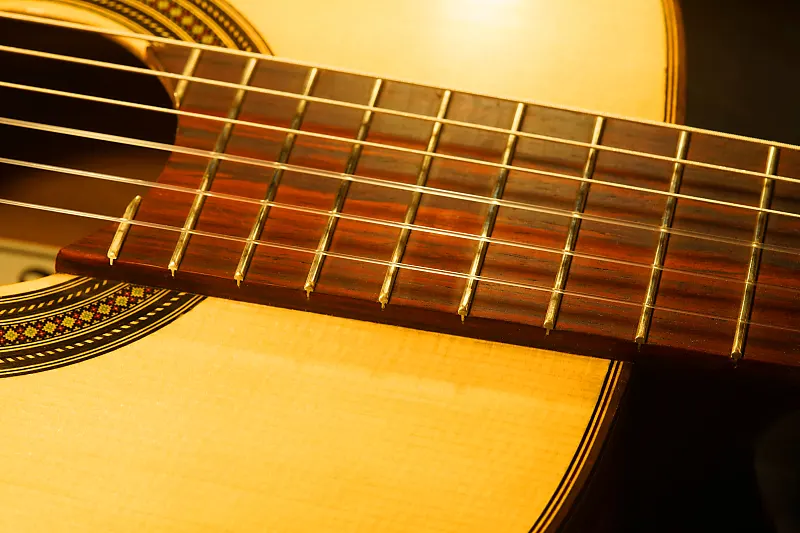Hey there, fellow guitarists! Have you ever wondered if your guitar strings have an expiration date? I know I have. As a self-proclaimed guitar enthusiast, my strings are like the lifeline of my instrument. But do they actually go bad? In this article, I’ll dive into the signs to look out for and share tips on how to extend their lifespan. So whether you’re a beginner or a seasoned player, let’s figure out if our guitar strings truly do have an expiration date.
So, do guitar strings go bad?
Guitar strings can go bad over time. Just like any other material, they are subject to wear and tear and will eventually lose their quality and sound. However, there are certain signs to look out for that indicate when it’s time to change your guitar strings.
One of the most obvious signs is when the strings start to feel rough or rusty. This can happen due to exposure to moisture or oils from your fingers while playing. As a result, the strings may become harder to play and produce a duller sound.
Another sign is when you notice a decrease in tone quality or intonation issues. If your guitar sounds out of tune even after tuning it properly, it could be a sign that your strings have stretched out too much and need replacing.
Additionally, if you see visible damage on the strings such as cracks or breaks, it’s definitely time for new ones. These damages not only affect the sound but also pose safety hazards while playing.
To extend the lifespan of your guitar strings, there are some simple steps you can take. Wiping down your strings with a clean cloth after each use helps remove excess oils and dirt that can cause corrosion. Also, storing your guitar in its case when not in use protects it from environmental factors that can damage the strings.
In conclusion, yes – guitar string do go bad over time but with proper care and maintenance, their lifespan can be extended significantly. It’s important to pay attention to these signs so you can replace them before they affect your playing experience negatively.
Identifying the Signs of Bad Guitar Strings
When you’re strumming your guitar and something just feels off, it could be the strings giving you trouble. One of the first signs that they need replacing is a dull or flat sound. Fresh strings have a bright, lively tone that seems to dance with every note you play. Over time, though, dirt and oil from your fingers can build up on the strings, causing them to lose their clarity. This gunk not only affects sound but also makes playing less enjoyable as your fingers may start to stick rather than glide smoothly over each string.
Another telltale sign is physical wear and tear on the strings themselves. Look closely: Are there any dark spots or noticeable fraying? Strings might even feel rough when you run your fingers along them instead of being silky smooth. These are classic signals that it’s time for new ones because damaged strings can break unexpectedly during a performance or practice session—never fun! Also watch out for tuning issues; if you’re constantly adjusting the pegs but can’t seem to keep things in tune, it’s likely due to old or worn-out strings stretching unevenly.
So next time something’s amiss with your guitar’s sound or feel, take a moment for some basic inspection—you might find those weary wires are ready for retirement.
Exploring Factors That Contribute to Guitar String Deterioration
When you pick up your guitar and notice the strings feeling dull or sounding off, it’s a sign they’re deteriorating. There are several reasons why this happens, with one of the main culprits being dirt and grime. Every time you play, oils from your fingers and tiny particles cling to the strings. Over time, this buildup tarnishes them, leading to rust and compromised sound quality. It’s like your favorite jeans getting worn out; they don’t feel or look the same after a while.
Another significant factor is humidity. Strings are sensitive to moisture in the air which can cause them to corrode faster than you’d expect. If you’re living in an area that swings between dry winters and humid summers, you’ll likely notice more frequent changes in string condition. Protecting your guitar by storing it properly—like keeping it in a case when not playing—can help mitigate some of these effects.
Additionally:
- Poor storage conditions
- Frequent use without proper maintenance
- Environmental contaminants such as smoke or dust
All these elements working together can really accelerate string deterioration. To extend their life just a bit longer, always wipe down your strings after playing and consider investing in coated ones that resist grime better than regular versions.
Read also: What age is a Yamaha JR2 for?
Maintenance Tips for Prolonging the Lifespan of Your Guitar Strings
Have you ever noticed how a fresh set of guitar strings can make your instrument sound like it’s singing? Keeping that magic alive involves more than just hoping for the best. First, let’s chat about cleanliness. Oils and dirt from your fingers can dull those bright tones over time. So, try to wash your hands before playing; it helps keep grime off the strings. Also, wipe them down with a clean cloth after each session—just give them a quick swipe, and you’ll notice a big difference in longevity.
Another important aspect is storage. When you’re not playing, store your guitar in its case if possible. This protects the strings from dust and fluctuating temperatures that could cause rust or corrosion. Use string conditioners if you’re serious about extending their life; these products help reduce friction and prevent buildup on the strings’ surface.
Additionally:
- Avoid extreme humidity levels as much as possible.
- Consider investing in humidifiers or dehumidifiers depending on where you live.
- Tune down when storing for extended periods to reduce tension.
By giving a little extra care to your guitar strings, you’ll find they not only last longer but also continue to deliver that crisp sound we all love so dearly!

Understanding How Different Types of Strings React Over Time
Have you ever noticed how the strings on your guitar or violin change over time? Strings don’t stay the same forever. They go through a fascinating journey from being bright and crisp to becoming worn out. When you first put new strings on, they often sound lively and vibrant. But with each session of playing, their tone starts to mellow out. This happens because as you press down on them and strum or bow them, they get tiny scratches and dents that affect the way they vibrate.
Different materials react in unique ways too! For example:
- Nylon strings tend to stretch more than metal ones.
- Steel strings, while initially very clear-sounding, can rust if exposed to moisture.
- Gut strings, used in some classical instruments, are sensitive to humidity changes.
Each type has its own life span depending on how often you play and how well you take care of them.
Over time, you’ll also find that tuning stability becomes an issue. As strings age, it gets harder for them to hold pitch consistently. The higher tension causes stress at points where they’re anchored—like the bridge or nut—and this wear can make even your best-loved instrument feel less reliable during performances or practice sessions.
So next time you’re replacing those old strands with fresh ones, take a moment to appreciate all they’ve been through! Understanding this process helps keep your music sounding its best for years to come.
You may also like: does woody harrelson play the piano
Conclusion: Ensuring the Longevity and Peak Performance of Your Guitar Strings
Have you ever thought about how much your guitar strings mean to you? They are the soul behind every melody, the unsung heroes of each tune. But just like anything we cherish, they need a bit of love and care to ensure they last long and sound great.
First off, it’s crucial to keep your hands clean before playing. Natural oils from our fingers can cause strings to wear out faster. A quick wash or even using a hand sanitizer can do wonders for longevity.
Additionally, always wipe down your strings after each session with a soft cloth; this little ritual helps remove sweat and grime that could tarnish them over time.
Another tip is tuning stability—don’t forget it! Constantly changing tunings puts extra tension on the strings, leading to quicker breakage. Try sticking with one preferred tuning for most sessions if possible.
Moreover:
– Keep an eye on humidity levels as well.
– Excess moisture can rust metal strings quickly.
Storing your guitar in a case when not in use certainly makes a difference too.
Lastly, considering coated or treated strings might be worth it—they often resist corrosion better than standard ones.
By following these simple steps consistently, you’re not only extending their life but also maintaining that crisp tone we all crave so much! Your music will thank you for it.

